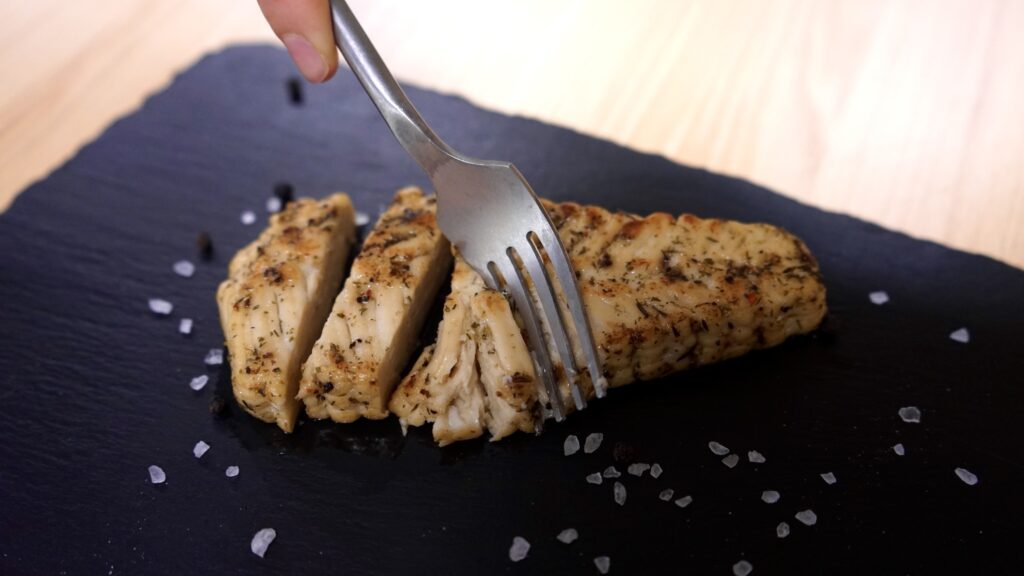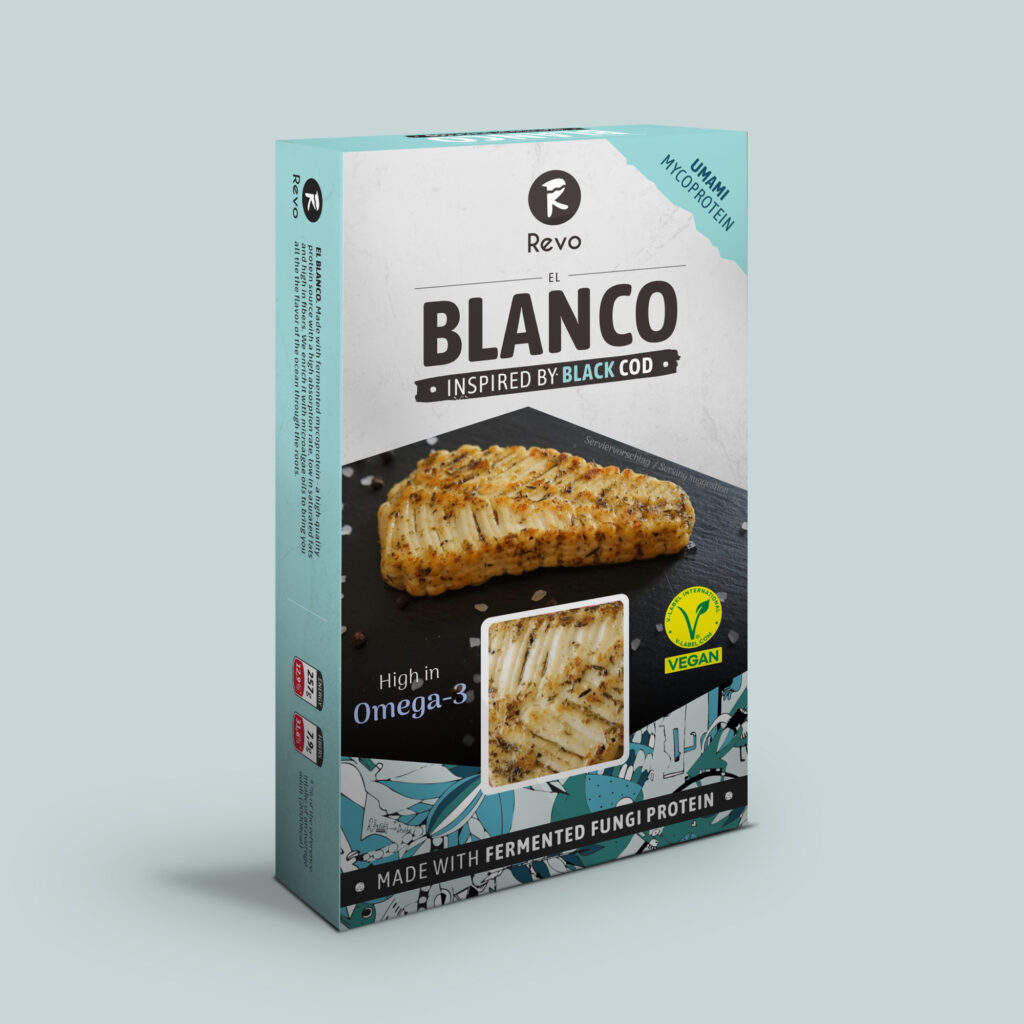5 Mins Read
Austrian 3D-printed seafood startup Revo Foods has witnessed rapid growth since opening its mycoprotein facility in September, and its CEO believes vegan seafood has a communication issue.
There is no inherent desire for most consumers to switch to fish-free seafood or think they “really need an alternative” to salmon, tuna, and the like, highlighting the industry’s communication problem, according to the CEO of one innovative startup.
“The plant-based industry had a dogma that if you replicate meat 100%, consumers will come, and I don’t think this is true anymore,” says Robin Simsa. He heads up Austria’s Revo Foods, which uses 3D printing and mycoprotein to make seafood analogues.
“I believe people care less about a one-to-one replica, but rather [they care about] a good protein source (like mycoprotein), prepared in an engaging and attractive way,” he says.
“There needs to be something desirable about our products, and this can be either nutritionally or based on ‘fun’ or ‘cool’ concepts, from longevity to crazy products where people think: ‘Why does this exist?'”
This is why Revo Foods has labelled its vegan seafood differently – it stopped selling a ‘Salmon Filet’ long ago. “Now, we sell a fermented fungi protein, which is ‘Inspired by Salmon’. A small change in wording, but it shifts the focus to a completely different highlight.”
The change in positioning has worked and then some. “We only opened our new production facility in September 2024, and since then, sales have been increasing 250% compared to the previous year,” Simsa says. “March was one of the best months in terms of sales since our beginning.”
In the US, vegan alternatives make up just 1% of the overall seafood market. They account for a similar share in the wider plant-based market too. In Germany and the UK, meanwhile, the sales value of alternative seafood grew by 10% from 2022-23, with units up by 6%.
Revo Foods is now “moving forward quite nicely”, thanks to new product releases, including the marinated filets it launched last month, and its latest product, a mycelium-fuelled take on black cod.
Titled ‘El Blanco – Inspired by Black Cod’ (in keeping with its communication strategy), the whitefish alternative will be available in Austrian and German supermarkets this month.
New tech helps Revo Foods speed up product development

Revo Foods’s latest seafood analogue has been produced with a new 3D extrusion technology at its production site, dubbed The Taste Factory, with an output of several tonnes per month.
Its computer-guided models transform unstructured proteins (like mycoprotein) into products with aligned, heterogeneous fibres. The integration of fat into the protein matrix is key, leading to a ‘flaky’ texture reminiscent of black cod.
The startup says it uses mycoprotein because it has a neutral taste and highly desirable nutritional profile. It contains all essential amino acids, has a high protein digestibility score, and is rich in fibre and low in carbs and saturated fat.
Mycoprotein can also double in biomass every five hours, making it one of the most efficient sources of protein on the planet. “Our salmon filet took us four years to develop. This new product took us three months,” Simsa says, outlining the proficiency of its continuous production system.
“We have built a foundation where we can test new product iterations quickly, and El Blanco is a prime example of this. We had four new products developed in this direction, and El Blanco was most desirable to many people in taste tests,” he adds.
“Our new 3D extrusion process really allows us to be super quick with product development and testing, which is exciting because the food industry is not normally known to be fast, and this gives us some new opportunities with more ‘obscure’ concepts in the future that might work amazingly, or might flop big time. We will announce some of these developments soon.”

A vegan alternative cheaper than ‘the real thing’
Aside from mycoprotein, El Blanco contains microalgae oil, which is rich in omega-3 fatty acids. The high fat content is a “source of pleasure”, says Simsa, which makes it taste like “fresh whitefish”. “We also add a marination to make it easier for people to just fry it in their kitchen without too much preparation,” he notes.
Encouragingly, the mycoprotein alternative is 25-30% cheaper than conventional black cod, which he calls a “rather expensive fish species” – a 110g unit in Austria and Germany retails for €3.99 ($4.30). This is important considering that cost has become the top purchase driver of seafood for 55% of Europeans, whose at-home consumption declined by six percentage points between spring 2021 and autumn 2024.
“We upscaled our production capacities in recent months and implemented a new extruder system, which could increase the output at our production site, which greatly benefits us in terms of production costs,” Simsa explains when asked how Revo Foods manages to undercut the cost of black cod. “We now run with two production shifts.”
The startup has raised over €10M ($10.8M) so far, and closed a €1.2M ($1.3M) investment round in January with existing and new investors. It will now extend this in a crowdfunding campaign on FunderNation to reach €1.5M ($1.6M).
In addition to El Blanco, it will release another new “ambitious” product in two weeks, which will follow its strategy of spotlighting mycoprotein instead of solely trying to mimic seafood. It won’t make “any comparisons with animal-based products”, but rather target a “performance/fitness group with a designer product optimised for nutrients”, says Simsa.
“We already sell in France, Denmark, Sweden, Italy, Spain, Portugal, the UK and other markets together with local distributors,” he adds. “In 2025, we will also start some exciting new partnership projects to bring our products forward in different geographies.”



